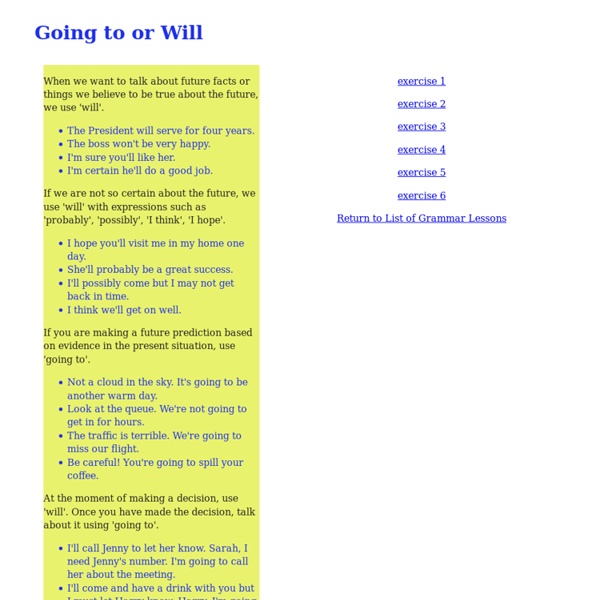Future Tense Will vs. Going To - English Grammar
A very confusing concept is when to use WILL and when to use BE GOING TO when we refer the future. Both refer to the future and there is a slight difference between the two though in most cases they can be used interchangeably with no difference in meaning. Even if you misuse them, a native speaker is going to understand you without any problems. Quick Summary Chart When to use GOING TO The structure BE GOING TO is normally used to indicate the future but with some type of connection to the present. 1. The decision has been made before the moment of speaking. They're going to retire to the beach - in fact they have already bought a little beach house.I'm going to accept the job offer. 2. Something is likely to happen based on the evidence or experience you have. I think it is going to rain - I just felt a drop.I don't feel well. 3. Get back! When to use WILL In other cases, where there is no implicit or explicit connection to the present, use WILL: 1. I'll buy one for you too. 2. 3. 4.
CFL- Engelska Repetitionskurs
Verbet är det viktigaste ordet i en mening. Det är själva händelsen, det man gör, som är verbet. (work, call, sing, jump). Formen av verbet som talar om när händelsen äger rum kallas för tempusformerna (tense). De tre vanligaste tempus är: Presens (Present tense) Det som sker nu eller vanligtvis. När du använder han/hon/den/det i en mening i nutid måste du alltid lägga till ett -s på verbet. - he plays, she plays, it plays. Imperfekt (Past tense) Uttrycker en händelse som ägde rum och avslutades någon gång i det förflutna. Perfekt (Perfect tense) Uttrycker en händelse som ägde rum vid någon obestämd tidpunkt i det förflutna eller när en händelse upprepas flera gånger i det förflutna. Perfektformen kan man känna igen på att man alltid måste ha Har (Has eller have) före verbet. Futurum (The Future Tense) På engelska finns det flera sätt att tala om framtiden, men WILL och GOING TO är de två vanligaste sätten. Använd will ('ll) när du beslutar att göra någonting precis vid det tillfället du talar.
I will not turn away from the things of God
English Grammar Online - free exercises, explanations, vocabulary, dictionary and teaching materials
I will marry
BATTLESHIP: IRREGULAR VERBS
Much to learn, you still have. – Joda. Despite the evidence that the number of irregular verbs is declining in the English language, there is no danger they will disappear, and the struggle will continue. There are many attempts to find a shortcut in learning irregular verbs, yet with all the options and “magic tricks” available, learning these verbs requires much memorization, drilling and practice. Today I will show how I use the Battleship game to drill and practise irregular verbs in a fun way. Before the game: Each player will need two 10×10 grids – one with irregular verbs in each square, and one blank grid. Click the Grids to download them. The players then mark where they want to place their ships by circling rows, horizontally or vertically. Each player’s fleet consists of the following ships: 1 aircraft carrier – 5 squares 1 battleship – 4 squares 1 cruiser – 3 squares 2 destroyers – 2 squares each 2 submarines – 1 square each How to play: some more games with irregular verbs from Engames.
I will a nice mom
Regular + Irregular verbs | Exercises | Worksheets | Pdf list
Regular + irregular verbs exercises Regular verbs: past simple and past participle 1. The regular past simple tense in the English language is usually formed by -ed ending (work - worked, stay - stayed). It is the same for all persons, singular and plural: I started, you started, he started, we played, they played. The spelling rules a) We add -d (not -ed) to the word that ends in -e. b) If it ends in a consonant and -y, we change -y into -i. c) If the regular verb has only one syllable and ends in a single vowel and a consonant, we double the consonant to keep the same pronunciation. The same rule applies to expressions with more syllables if the stress falls on the last syllable: ad'mit - admitted, pre'fer - preferred.But: 'enter - entered (the stress is not on the last syllable). 2. Regular verbs list (pdf) As you see below, there are a lot of cases in the English language when you must change the spelling if you add the -ed ending: Regular forms with different spelling Our tips top
I will working in a important Company
TurboEnglish - Getting It Right! - engelsk grammatik
Nedan följer en lista med länkar till 21 korta videofilmer på Youtube. I varje film tar gymnasieläraren Henrik Birkebo upp ett moment inom den grundläggande engelska grammatiken och under varje länk kan du läsa en kort beskrivning av respektive films innehåll. Högerklicka på länken och öppna i nytt fönster (beroende på vilken webbläsare du har). För att befästa dina kunskaper finns det även en hänvisning till lämpligt och roligt övningsmaterial. När du har tittat på respektive film en eller flera gånger är det bara att klicka på länkarna under "Öva". Låt dig inspireras att hugga tag i den grundläggande grammatiken! "Fågel", "fisk" och "kärlek" är exempel på ord tillhörande ordklassen substantiv. Hur blir det med pluralformen av substantiv på engelska? Genitivformen av substantiv uttrycker gärna ägande (ex. Här får du lära dig vilka de personliga pronomenen är och hur de används. Som i "vi roar oss" (= "we amuse ourselves"). De possessiva pronomenen uttrycker ägande (eng. Öva:
I will graduate in Business Administration from



